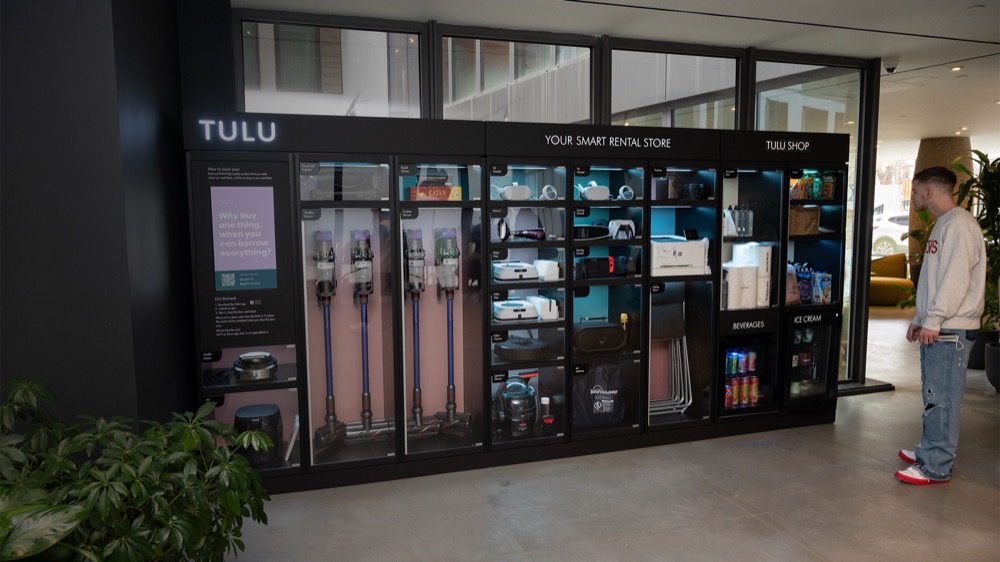As real estate owners face mounting pressure to justify premium rents in increasingly competitive urban markets, the traditional amenity playbook of gyms and rooftop lounges no longer drives meaningful differentiation or retention. At the same time, Gen Z and millennial renters prioritize access over ownership, with 89% planning to maintain or increase spending on shared goods in 2025, while 45% of global emissions stem from producing and consuming household products that sit idle most of their lives. TULU addresses this convergence by embedding AI-powered product access platforms directly into residential buildings, turning underutilized lobby space into on-demand rental hubs for everything from Dyson vacuums to PlayStation 5s. Through proprietary data from over 10 million user interactions across 500,000 residents in 60 cities, their TULU Brain platform personalizes inventory while delivering landlords measurable increases in lease renewals and providing brand partners like Bosch and Kärcher with unprecedented insights into real-world product usage patterns. TULU positions itself at the intersection of proptech innovation and the circular economy, making the shift from ownership to usage both convenient and data-driven.
AlleyWatch sat down with TULU Cofounder and Chief Customer Officer Yael Shemer to learn more about the business, its future plans, recent Series A extension, and much, much more…
Who were your investors and how much did you raise?
We’re excited to share that we’ve closed our Series A, bringing total funding to $37M, with a new $17M co-led by GreenSoil PropTech Ventures, together with our existing partners Bosch Ventures and New Era Capital Partners.
Other existing investors participating in the round include Regeneration.VC, Good Company, Aviv Growth Ventures, and i3 Partners.
This round reflects both the continued conviction of our existing partners and the fresh perspective that GreenSoil brings as a new investor. We’re very fortunate to have a group of investors who provide real strategic value across every layer of our business — from properties and brands to consumers.
Tell us about the product or service that Tulu offers.
TULU enables building residents to access shared products on demand. With nothing more than a wall in a lobby, lounge, laundry, or bike room, TULU’s plug-and-play IoT-based units provide 24/7 access to a variety of brand-name products — from vacuums, VR headsets, and e-scooters to projectors and essential household supplies. Each unit is customized to a building’s needs and core tenant base, allowing users to rent or purchase products seamlessly through the TULU app.
What inspired the start of Tulu?
Our CEO, Yishai Lehavi, is a former architect, and I come from an environmental entrepreneurship background. We met at an accelerator at MIT (DesignX and OGS), and pretty quickly realized we shared the same passion for reimagining how people live – and how proximity and density in cities could be used to build a more efficient and sustainable way of consuming. Yishai brought a deep understanding of the built environment, and I came with a perspective on alternative consumption and minimalism – and together, those ideas became the foundation for what eventually became TULU.
How is Tulu different?
TULU’s competitive edge really comes from our go-to-market strategy. We’ve built a fully interconnected ecosystem of consumers, properties, and brands.
Consumers love the convenience of on-demand access right where they live; Properties see TULU as a unique amenity that helps them attract and retain residents; And brands view us as an opportunity to get as close as it gets to their customers – inside the home, in the moment of real usage.
Because we bring these three worlds together, the TULU brand is already becoming synonymous with in-building, on-demand access – similar to how “Xerox,” “Laundromat,” or even “Escalator” became category names.
Now, when you look at competitors, most offer a single piece of what we do. Some provide lockers. Some rentals. Some digital access. But they fall short of delivering a holistic experience that blends the physical world, the digital layer, and ongoing engagement.
And the real differentiator is our data. With over 10 million interactions to date, our AI and machine-learning engine – the TULU Brain – allows us to drive usage, personalize inventory, and accelerate engagement in a way that would take others years to build.
What market does Tulu target and how big is it?
TULU’s total addressable market includes every household worldwide, as our consumer touchpoints can exist anywhere people live, work, or spend time. While our current go-to-market strategy focuses on multifamily and student housing buildings across North America, the UK, and the EU – representing a potential of more than 160 million apartments and beds – TULU’s touchpoints can also be deployed in office buildings, hotels, and retail centers. This makes virtually every medium-to-large city globally a potential market for TULU.
These renters in these markets spend hundreds of billions of dollars a year on home products, tools, small appliances, and convenience items – most of which are used a handful of times and then stored or thrown away. We’re building the infrastructure for that spending to shift from ownership to access. The opportunity is global and in the multi-billion dollar range just within our current segments.
What’s your business model?
Our business model is built around delivering unique value to every part of the TULU ecosystem – residents, landlords, and brands.
Residents subscribe to TULU for unbeatable convenience: on-demand access to high-quality products, right when they need them, without the cost or hassle of ownership.
Landlords pay TULU to offer our experience as a premium amenity – one that helps them attract residents, retain them longer, and differentiate their buildings.
Brands pay us to place their products inside TULU Units for exposure, run pilots, and learn from real usage data about how people interact with their products in their everyday lives.
Together, these three revenue streams create strong recurring revenue with solid unit economics – which is what enables our accelerated growth.

How are you preparing for a potential economic slowdown?
In many ways, TULU is actually built for that kind of environment.
For residents, access is significantly cheaper than ownership. You don’t need to buy a $600 vacuum or an $800 projector when you can simply grab one downstairs exactly when you need it. In a downturn, that value proposition only becomes stronger.
For landlords, we’re a high-impact, relatively low-cost amenity that helps leases get signed and renewed. As residents look for more value in their buildings, TULU becomes an even more attractive differentiator.
For brands, we offer one of the most efficient ways to reach real potential customers – inside their homes, using the product in real life. It’s targeted, measurable, and cost-effective, which matters even more when marketing budgets tighten.
And importantly, TULU is already operationally profitable. If we ever needed to slow down growth, we could continue running a healthy business. Growth capital is fuel for acceleration – not a lifeline.
What was the funding process like?
Honestly, it was driven mostly by relationships, traction, and conviction.
The process felt very organic. GreenSoil – a property-focused investor backed by some of the largest owners and developers in Canada – immediately understood what we’re building. When we sat with one of their general partners, someone who comes directly from the real estate world, he got the value within minutes. He literally said, “I get it. This is exactly what helps me bring residents in and keep them in my buildings.”
From there, things moved quickly. GreenSoil asked to join and lead the new round, alongside our existing investors Bosch Ventures and New Era Capital Partners. Then other existing investors stepped in as well. They’ve seen our performance, our economics, and our scalability, so it didn’t feel like a traditional fundraising “process” – more like the natural continuation of a round that everyone believed in.
What made it especially smooth was the alignment. Everyone around the table cares about creating better, more efficient, more sustainable urban living. That shared vision made the entire experience easy, collaborative, and very natural (And of course, seeing the financial opportunity in TULU didn’t hurt either…)
What are the biggest challenges that you faced while raising capital?
One of the biggest challenges – and honestly, one of the biggest rewards – is that TULU doesn’t fit neatly into a traditional investment category. Are we Proptech? Retail? Consumer? Climate? AI?
The truth is, we’re creating a new category, and that naturally requires some education. Investors need to understand the full scope of what we’re building and the size of the opportunity – and that takes a deeper conversation than a typical single-vertical startup.
And a new category isn’t for everyone. To invest in TULU, you need an entrepreneurial mindset. You need the conviction that this is how the world should look, the optimism that this is how the world will look, and the belief that we are the team that will bridge the gap between the “should” and the “will.”
We’re fortunate to have both new and existing investors who share those three beliefs — and that alignment made all the difference.
What factors about your business led your investors to write the check?
From our conversations, a few themes came up again and again:
First, we’ve built a growth machine in a massive market – with huge organic demand and very strong product–market fit. Investors could clearly see the traction.
Second, they were excited about the moat we’ve created. TULU has now crossed a critical-mass point: our scale, our operational footprint, and especially our data make it increasingly hard for anyone to compete with us. Every new building, every new user, every new product strengthens that moat even further.
Third, our fundamentals stood out. Our landlord relationships, usage performance, unit economics, and retention rates all made it easy for investors to build conviction.

What are the milestones you plan to achieve in the next six months?
Over the next six months, we’re essentially building the plane while flying it. We’ll be bringing in more exceptional team members to help us continue shaping this transformative company and fueling our mission.
On the business side, we plan to onboard hundreds of additional buildings onto the TULU network, expand our footprint across key markets, and continue improving the resident experience through new features in our digital platform.
We’re also rolling out additional capabilities of the TULU Brain to personalize assortments and tailor the experience to each building and resident segment.
And finally, we’ll be expanding our brand partnerships across categories like cleaning, small appliances, entertainment, and mobility.
What advice can you offer companies in New York that do not have a fresh injection of capital in the bank?
It really depends on the stage of the company. At a growth stage, the numbers do most of the talking. In our case, it was our growth rate and our unit economics. The broader vision matters, of course, but the hook and the conviction come from business performance before anything else.
The fundraising process itself needs to run like a sales machine: build a top-of-funnel, convert intro emails into a first call, then a second call, and so on. Volume matters – but quality matters even more. If you bring in unqualified leads, you’ll waste time coordinating with investors who find your story “interesting” but ultimately will never invest. Those calls can be useful early on to practice your pitch, but once the pitch is dialed in, your time becomes too valuable for that.
Warm introductions are absolutely crucial. And getting them requires a lot of preparation: mapping out your network, asking founder friends, and working closely with existing investors on who they can credibly introduce you to. We saw a clear pattern in response rates:
intros coming directly from the founders
then warm intros from other founders
and only then intros from our investors
And a final, very practical point: always ask the person making the intro how strong they feel the intro is. It’s a completely fair question. Don’t be shy – it saves you from burning a lead with a weak intro that doesn’t carry real weight.
Where do you see the company going now over the near term?
Our goal is for TULU to become a standard of urban living — something that follows people through every stage of life: from the student dorm, to the first apartment in the city, to the next building, and the next. We’re already seeing this play out. A user can start in a TULU-enabled student housing building in Amsterdam, move to their first apartment in a TULU building in London, and later relocate to a TULU building in New York. That’s the future we’re building — and it’s already happening.
Ultimately, TULU is a go-big-or-go-home company. Today, our challenge is to educate residents and landlords about a new mode of consumption — one based on access rather than ownership. But in the future, the mindset shift won’t come from us; it will come from reality. People will simply expect their building to have TULU. They’ll move in without all the unnecessary things they used to buy and store, because they’ll know that whatever they need is waiting for them downstairs.
And that future isn’t far away – it’s near term.
What’s your favorite fall destination in and around the city?
For me, In the city: a run through Prospect Park on a crisp fall morning.
Outside the city: a quick escape to the Hudson Valley – somewhere with trees, a tiny town, and a good coffee shop. It’s the perfect reset before winter and the next sprint.






















